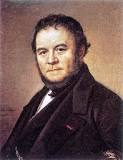The Red and the Black Page #6
Le Rouge et le Noir is a historical psychological novel in two volumes by Stendhal, published in 1830. It chronicles the attempts of a provincial young man to rise socially beyond his modest upbringing through a combination of talent, hard work, deception, and hypocrisy.
"Ah, monsieur," he said to the curé as soon as he saw him, "is not the gentleman whom I see there, M. Appert?" "What does that matter?" said the curé. "The reason is that I received yesterday the most specific orders, and M. the Prefect sent a message by a gendarme who must have galloped during the whole of the night, that M. Appert was not to be allowed in the prisons." "I can tell you, M. Noiroud," said the curé, "that the traveller who is with me is M. Appert, but do you or do you not admit that I have the right to enter the prison at any hour of the day or night accompanied by anybody I choose?" "Yes, M. the curé," said the jailer in a low voice, lowering his head like a bull-dog, induced to a grudging obedience by fear of the stick, "only, M. the curé, I have a wife and children, and shall be turned out if they inform against me. I only have my place to live on." "I, too, should be sorry enough to lose mine," answered the good curé, with increasing emotion in his voice. "What a difference!" answered the jailer keenly. "As for you, M. le curé, we all know that you have eight hundred francs a year, good solid money." Such were the facts which, commented upon and exaggerated in twenty different ways, had been agitating for the last two days all the odious passions of the little town of Verrières. At the present time they served as the text for the little discussion which M. de Rênal was having with his wife. He had visited the curé earlier in the morning accompanied by M. Valenod, the director of the workhouse, in order to convey their most emphatic displeasure. M. Chélan had no protector, and felt all the weight of their words. "Well, gentlemen, I shall be the third curé of eighty years of age who has been turned out in this district. I have been here for fifty-six years. I have baptized nearly all the inhabitants of the town, which was only a hamlet when I came to it. Every day I marry young people whose grandparents I have married in days gone by. Verrières is my family, but I said to myself when I saw the stranger, 'This man from Paris may as a matter of fact be a Liberal, there are only too many of them about, but what harm can he do to our poor and to our prisoners?'" The reproaches of M. de Rênal, and above all, those of M. Valenod, the director of the workhouse, became more and more animated. "Well, gentlemen, turn me out then," the old curé exclaimed in a trembling voice; "I shall still continue to live in the district. As you know, I inherited forty-eight years ago a piece of land that brings in eight hundred francs a year; I shall live on that income. I do not save anything out of my living, gentlemen; and that is perhaps why, when you talk to me about it, I am not particularly frightened." M. de Rênal always got on very well with his wife, but he did not know what to answer when she timidly repeated the phrase of M. le curé, "What harm can this Paris gentleman do the prisoners?" He was on the point of quite losing his temper when she gave a cry. Her second son had mounted the parapet of the terrace wall and was running along it, although the wall was raised to a height of more than twenty feet above the vineyard on the other side. The fear of frightening her son and making him fall prevented Madame de Rênal speaking to him. But at last the child, who was smiling at his own pluck, looked at his mother, saw her pallor, jumped down on to the walk and ran to her. He was well scolded. This little event changed the course of the conversation. "I really mean to take Sorel, the son of the sawyer, into the house," said M. de Rênal; "he will look after the children, who are getting too naughty for us to manage. He is a young priest, or as good as one, a good Latin scholar, and will make the children get on. According to the curé, he has a steady character. I will give him three hundred francs a year and his board. I have some doubts as to his morality, for he used to be the favourite of that old Surgeon-Major, Member of the Legion of Honour, who went to board with the Sorels, on the pretext that he was their cousin. It is quite possible that that man was really simply a secret agent of the Liberals. He said that the mountain air did his asthma good, but that is something which has never been proved. He has gone through all Buonaparte's campaigns in Italy, and had even, it was said, voted against the Empire in the plebiscite. This Liberal taught the Sorel boy Latin, and left him a number of books which he had brought with him. Of course, in the ordinary way, I should have never thought of allowing a carpenter's son to come into contact with our children, but the curé told me, the very day before the scene which has just estranged us for ever, that Sorel has been studying theology for three years with the intention of entering a seminary. He is, consequently, not a Liberal, and he certainly is a good Latin scholar. "This arrangement will be convenient in more than one way," continued M. de Rênal, looking at his wife with a diplomatic air. "That Valenod is proud enough of his two fine Norman horses which he has just bought for his carriage, but he hasn't a tutor for his children." "He might take this one away from us." "You approve of my plan, then?" said M. de Rênal, thanking his wife with a smile for the excellent idea which she had just had. "Well, that's settled." "Good gracious, my dear, how quickly you make up your mind!" "It is because I'm a man of character, as the curé found out right enough. Don't let us deceive ourselves; we are surrounded by Liberals in this place. All those cloth merchants are jealous of me, I am certain of it; two or three are becoming rich men. Well, I should rather fancy it for them to see M. de Rênal's children pass along the street as they go out for their walk, escorted by their tutor. It will impress people. My grandfather often used to tell us that he had a tutor when he was young. It may run me into a hundred crowns, but that ought to be looked upon as an expense necessary for keeping up our position." This sudden resolution left Madame de Rênal quite pensive. She was a big, well-made woman, who had been the beauty of the country, to use the local expression. She had a certain air of simplicity and youthfulness in her deportment. This naive grace, with its innocence and its vivacity, might even have recalled to a Parisian some suggestion of the sweets he had left behind him. If she had realised this particular phase of her success, Madame de Rênal would have been quite ashamed of it. All coquetry, all affectation, were absolutely alien to her temperament. M. Valenod, the rich director of the workhouse, had the reputation of having paid her court, a fact which had cast a singular glamour over her virtue; for this M. Valenod, a big young man with a square, sturdy frame, florid face, and big, black whiskers, was one of those coarse, blustering, and noisy people who pass in the provinces for a "fine man."
Translation
Translate and read this book in other languages:
Select another language:
- - Select -
- 简体中文 (Chinese - Simplified)
- 繁體中文 (Chinese - Traditional)
- Español (Spanish)
- Esperanto (Esperanto)
- 日本語 (Japanese)
- Português (Portuguese)
- Deutsch (German)
- العربية (Arabic)
- Français (French)
- Русский (Russian)
- ಕನ್ನಡ (Kannada)
- 한국어 (Korean)
- עברית (Hebrew)
- Gaeilge (Irish)
- Українська (Ukrainian)
- اردو (Urdu)
- Magyar (Hungarian)
- मानक हिन्दी (Hindi)
- Indonesia (Indonesian)
- Italiano (Italian)
- தமிழ் (Tamil)
- Türkçe (Turkish)
- తెలుగు (Telugu)
- ภาษาไทย (Thai)
- Tiếng Việt (Vietnamese)
- Čeština (Czech)
- Polski (Polish)
- Bahasa Indonesia (Indonesian)
- Românește (Romanian)
- Nederlands (Dutch)
- Ελληνικά (Greek)
- Latinum (Latin)
- Svenska (Swedish)
- Dansk (Danish)
- Suomi (Finnish)
- فارسی (Persian)
- ייִדיש (Yiddish)
- հայերեն (Armenian)
- Norsk (Norwegian)
- English (English)
Citation
Use the citation below to add this book to your bibliography:
Style:MLAChicagoAPA
"The Red and the Black Books." Literature.com. STANDS4 LLC, 2025. Web. 8 Mar. 2025. <https://www.literature.com/book/the_red_and_the_black_201>.








Discuss this The Red and the Black book with the community:
Report Comment
We're doing our best to make sure our content is useful, accurate and safe.
If by any chance you spot an inappropriate comment while navigating through our website please use this form to let us know, and we'll take care of it shortly.
Attachment
You need to be logged in to favorite.
Log In